Reviews
HCFF Review: The Origins of Wit and Humor
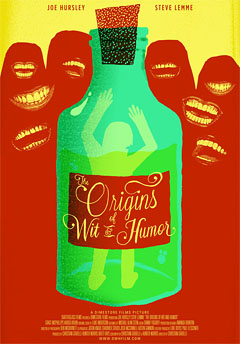 Charming indie film The Origins of Wit and Humor, which screened earlier this month at the Hill Country Film Festival, appears at first to be a romantic comedy, but ultimately leans heavily on the comedy, as hinted in the title. In fact, you could argue that this movie is a romantic comedy in which humor portrays the femme fatale the protagonist pursues -- the storyline chronicles the repercussions of his entanglements with this demanding love interest.
Charming indie film The Origins of Wit and Humor, which screened earlier this month at the Hill Country Film Festival, appears at first to be a romantic comedy, but ultimately leans heavily on the comedy, as hinted in the title. In fact, you could argue that this movie is a romantic comedy in which humor portrays the femme fatale the protagonist pursues -- the storyline chronicles the repercussions of his entanglements with this demanding love interest.
Les (Joe Hursley) is a comedy writer who's completely devastated when seemingly out of nowhere, his longtime girlfriend moves out. He can't write, he can't function, he has no idea how to approach women, despite encouragement from his best friend Pops (Steve Lemme). On a whim, Les sends off a mail-order form from the back of an old book (with the same title as the film) and receives a "potion" that will allegedly make him irresistably funny to all women. And the big problem is that unlike "X-ray specs" and the Charles Atlas program, the potion turns out to work.
The Origins of Wit and Humor has a tendency to favor broad comedy over character and plot consistency, when given the choice, with occasional misfires. For example, the scene where Les seeks out the source of the potion he has taken is just silly and feels forced. On the other hand, a sequence that pays tribute to silent movies didn't have much tie-in to the plot but it's so funny, it hardly matters.
Hursley has a talent for hilariously appropriate facial expressions that don't cross over into shameless mugging -- he reminded me a little of Hugh Laurie back in the Bernie Wooster years. He and Lemme together make just about any situation more humorous. The female characters don't get much to do in the movie apart from Grace McPhillips as Pops' wife, who is immune to Les's charms and also pretty amusing with her own reaction shots. She also gets a nice moment in a diner with Les -- she's probably the smartest character in the film.
Review: Welcome To Me

In her seven seasons as a cast member on Saturday Night Live, Kristen Wiig became known for an array of bizarre recurring characters and for taking on difficult and highly memorable impressions (Bjork, Kathie Lee Gifford and Suze Orman spring immediately to mind). She's done her fair share of comedic film work, but in the last few years has really found her niche in indie dramadies. With The Skeleton Twins and Hateship Loveship under her belt, Wiig now appears in her strongest performance to date in Welcome to Me as Alice Klieg, a woman with borderline personality disorder.
The concept works because it is too absurd to be true. Essentially, it begins with the fact that Alice has a complicated relationship with television. It has comforted, cared and educated her over the years. Despite her mental issues, she's stopped taking her prescribed medications and relies on piles of VHS tapes to calm her nerves. She leaves the television on in her apartment at all times, telling a visitor to her home that it hasn't been turned off in 11 years. Before she can go out into the world, Alice will sit down and pop in an old Oprah episode into the VCR, reciting every line of dialogue. To her, these Oprah episodes have been a better guide for living her life than the time spent with her therapist (Tim Robbins). Spontaneity is not Alice's specialty, often expressing her feelings in "prepared statements" handwritten in advance to spare her from getting too emotional in the heat of the moment.
One night, Alice turns on the California Lottery and matches the numbers to her recently purchased ticket to discover that she has won a massive $86 million dollar jackpot. Without the checks and balances of proper care for her illness, her newfound wealth enables her to invest in the lifelong dream of having her own talk show. She teams up with New Vibrant Studios, home to a struggling local home-shopping network owned by brothers Rich (James Marsden) and Gabe (Wes Bentley) and offers to pay upfront to produce her show, which quickly goes from a weekly program (entitled Welcome To Me, with increasingly more complex opening title sequences as the show goes on) to a daily one.
HCFF Review: Night Owls
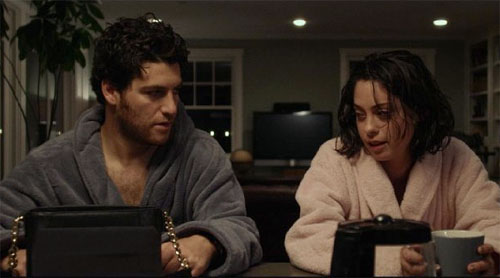
An ambitious young man finds himself tending to his boss's girlfriend -- his married boss's secret girlfriend -- who's in despair. It sounds like the middle of The Apartment, but it's actually the focus of Night Owls, a feature that premiered at SXSW and just screened at the Hill Country Film Festival, where it won the Cinema Dulce Best of Fest award. The indie owes a large debt to the 1960 Billy Wilder film without feeling like a remake or tribute.
The movie opens with Madeline (Rosa Salazar) taking Kevin (Adam Pally) home for a boozy one-night stand ... or so Kevin thinks. It's only after their brief liaison that Kevin, about to slip out of the house, realizes in stages that a) it's not her house, it belongs to his boss; b) Madeline's been involved with his boss in some way; and c) she's out cold in the bathroom after overdosing on something unknown.
Lone Star Cinema: Poltergeist (1982)
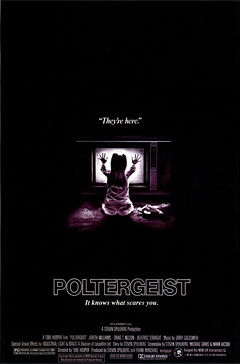 I realize I'm cheating a bit by considering Poltergeist a Lone Star Cinema selection, since the connections seem pretty sparse, as you'll see in the last paragraph. Watching the trailer for the upcoming remake (in theaters later this month) made me want to see the 1982 movie again -- I'd seen it only once before, on a bootleg VHS tape in the mid-1980s.
I realize I'm cheating a bit by considering Poltergeist a Lone Star Cinema selection, since the connections seem pretty sparse, as you'll see in the last paragraph. Watching the trailer for the upcoming remake (in theaters later this month) made me want to see the 1982 movie again -- I'd seen it only once before, on a bootleg VHS tape in the mid-1980s.
The most surprising thing about Poltergeist is how very odd it is. It's just weird, at least from a contemporary point of view. It's as though someone took the hallmarks of Steven Spielberg's 1980s filmmaking and twisted them into something almost distastefully creepy. That someone may have been director Tobe Hooper (The Texas Chain Saw Massacre) or producer/co-writer Spielberg himself. I was entirely absorbed by the movie this go-round, but I can't really say I liked it.
For anyone left who hasn't heard of the movie (or only knows its "They're here!" tagline), Poltergeist is about a typical suburban family that has to deal with strange, supernatural activities in their otherwise typical suburban house, just as contractors are digging up part of the yard for a swimming pool. The younger daughter, Carol Anne, is particularly susceptible ... and eventually vanishes into thin air, although audible from the static-y TV set (who else remembers static?).
One thing I do remember from seeing Poltergeist as a teenager is my utter amazement that even though Carol Anne is kidnapped by supernatural beings, the family continues to live in the house. I still can't believe they stay there as long as they do, although that does add extra satisfaction to the final scene. This time, though, I can't believe that they don't call the police or let anyone know about Carol Anne's appearance except a handful of parapsychologists, led by Dr. Lesh (Beatrice Straight). And of course you know Zelda Rubinstein is going to turn up eventually.
(Aside: While I saw Poltergeist on crappy VHS, I saw Poltergeist 2 in a theater, on a date. I realize now that I remembered the sequel more clearly than the original, which led to further surprises since I recalled different outcomes for certain characters. I am slightly tempted to watch the sequel again to verify, but I also remember that movie as being mega-dumb, so nope.)
Review: Clouds of Sils Maria
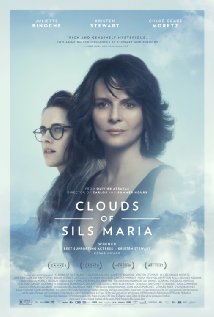 You may have already heard a few things about Clouds of Sils Maria -- including that Kristen Stewart achieved the nearly impossible by winning a major French acting award in a French movie playing opposite the French goddess (emphasis mine) Juliette Binoche.
You may have already heard a few things about Clouds of Sils Maria -- including that Kristen Stewart achieved the nearly impossible by winning a major French acting award in a French movie playing opposite the French goddess (emphasis mine) Juliette Binoche.
This is a fine starting point, but there is so much more (so much more) to talk about here. Director Olivier Assayas has made a film that explores the kind of relationship not usually depicted onscreen (and rarely with such grace and intelligence), while here and there upending traditional narrative and editorial techniques to great effect.
Binoche is the star of the film, meaning she has more screen time than anyone and also plays a film star named Maria Enders. Maria is enjoying artistic success even as the inevitability of middle age -- terrifying for an actress -- starts to make its presence known.
Maria first finds fame when she plays a young, self-assured woman who seduces and destroys an older woman (who is also her boss and lover). Twenty years later, Maria has been asked to play the older character in the same play in an updated London production. This proposition challenges her heart and soul and offends her vanity but appeals to her sense of self-confidence and intellect.
She knows taking the role will be a power move. Mastering the nuances of two such different people would bring her wider fame and adoration for a little while longer, but in the wake of her recent divorce and the death of a mentor, Maria knows this exercise will be taxing, as well.
Review: Avengers: Age of Ultron
 The day is finally here, and fans assemble for the follow-up to Marvel's 2012 Joss Whedon-directed hit movie The Avengers. This week's new release, Avengers: Age of Ultron, was also written and directed by Whedon, creator of hit TV franchises Buffy the Vampire Slayer, Angel and Firefly.
The day is finally here, and fans assemble for the follow-up to Marvel's 2012 Joss Whedon-directed hit movie The Avengers. This week's new release, Avengers: Age of Ultron, was also written and directed by Whedon, creator of hit TV franchises Buffy the Vampire Slayer, Angel and Firefly.
Marvel continues to tie events in its film franchise to its TV series Agents of SHIELD, which provides a plausible reason for the group of superheroes to reunite in search of Loki's sceptre. The sceptre has fallen into dangerous hands in the wake of SHIELD's collapse, as witnessed in Captain America: The Winter Soldier and Agents of SHIELD. The recapture of that artifact leads to the creation of Ultron, a new and deadly cybernetic enemy bent on the team's destruction.
James Spader voices Ultron, and it's hard not to like the villain perhaps more than the heroes with his matter-of-fact quips and insults, always several steps ahead of the team as he descends into creepy madness.
Whedon is an expert at balancing an ensemble cast, and this is one of the largest to date with 12 major players who all get ample screentime and character development. That said, Avengers: Age of Ultron is very much made for fans and presented with the expectation that the audience will be versed in the backstories of the characters through Marvel's other movies at a minimum, if not Avengers comic-book storylines as well. Students, er, audience members, who haven't done the required reading may find themselves overwhelmed as new characters are introduced and the action jumps from place to place.
Review: Adult Beginners
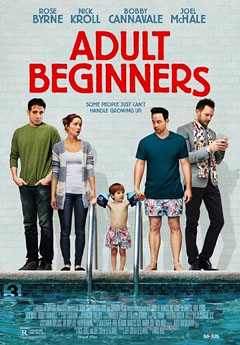 Have you seen the indie film about the young ambitious-but-party-loving professional who has to move in with relatives after a heartbreaking business failure? Or how about the one where the estranged siblings are thrown back together and try to rebuild a strong relationship, in spite of their parents? Or maybe the movie where the single person or childless couple learn how much they've missed by not having children in their lives.
Have you seen the indie film about the young ambitious-but-party-loving professional who has to move in with relatives after a heartbreaking business failure? Or how about the one where the estranged siblings are thrown back together and try to rebuild a strong relationship, in spite of their parents? Or maybe the movie where the single person or childless couple learn how much they've missed by not having children in their lives.
Adult Beginners retreads these all-too-familiar paths, but in such a pleasant way -- and with such an amusing cast -- that it's rarely tiresome.
Jake (Nick Kroll) is one of those entrepreneurial types so familiar here in Austin (although he's wheeling and dealing in NYC) ready to launch The Next Big Thing. At the peak of his fabulous launch party, however, the venture collapses irretrievably, leaving him broke, unemployed and lacking any belief that he can do much of anything successfully. Jake moves in with his sister Justine (Rose Byrne) and her husband Danny (Bobby Cannavale), out to their parents' old home in the suburbs, and he agrees to be their son Teddy's nanny in return for room and board.
At this point the movie shifts into predictable patterns: Jake learning how to care for a child, Jake dealing with nannies, Justine and Danny coping with having a self-centered man-child in their home, Jake and Justine rebuilding their relationship. I keep mixing up plot elements in my head with The Skeleton Twins (especially because of the pool element) and even In a World (unrelated: keep an ear out for Fred Malamed's voice in this movie too).
As with both those movies, the cast adds strength and interest to the more familiar aspects of the plot. Kroll and Byrne may not look much like siblings but they have the interaction down pat -- especially during/after Skype calls to their father and his wife. Byrne's character is probably the best-written of the bunch, with some lovely moments that push the role above the standard "exasperated but supportive wife and sister" cliche. I particularly liked a scene in a coffeehouse with a student she's mentoring. Cannavale's character is far more standard but he hits every note perfectly.
Review: Ex Machina
 Screenwriter Alex Garland is responsible for a number of highly regarded science-fiction screenplays including 28 Days Later, Never Let Me Go and Dredd. With Ex Machina, which opened Friday, Garland for the first time adds directing on top of his writing credits. Ex Machina has taken the film festival circuit by storm and received accolades as a Drafthouse Recommends title. However, the more I think about it, the more I feel this movie is overrated.
Screenwriter Alex Garland is responsible for a number of highly regarded science-fiction screenplays including 28 Days Later, Never Let Me Go and Dredd. With Ex Machina, which opened Friday, Garland for the first time adds directing on top of his writing credits. Ex Machina has taken the film festival circuit by storm and received accolades as a Drafthouse Recommends title. However, the more I think about it, the more I feel this movie is overrated.
Ex Machina is a richly beautiful, smart, thought-provoking work of science fiction that unfortunately suffers from a viciously sexist underlying theme. Oscar Isaac plays Nathan, a charismatic cyber genius who at the age of 13, wrote the software that would eventually become Google. He invites Caleb (Domhnall Gleeson), an employee chosen by lottery, to spend a week at his remote estate for a kind of sick Willy Wonka-esque robot nightmare tour.
Nathan explains to Caleb that he has been brought to spend the week playing the human role in the Turing Test, a standard of artificial intelligence research in which a human and an AI interact. The AI passes the test if the human can't tell he's talking to a computer. Of course, it should be obvious already that by telling Caleb he's going to speak to an AI that Nathan has blown the parameters of the test.
But Nathan's plan is darker and unclear. He spends his mornings working out and his evenings passing out drunk with very little time in between for any real scientific research, and during ominous power outages Ava (Alicia Vikander) tells Caleb that Nathan can't be trusted. Tensions mount as Caleb is so convinced by Ava that he begins to doubt his own humanity.
So why do I call it sexist? Aside from gratuitous nudity and the fratboy lifestyle Nathan leads, the premise of this film is two men sitting in judgement of an innocent woman, deciding her fate. She lives her very brief life on a leash, completely under the control of Nathan, subject to his whims and frustrations. Caleb falls head-over-heels in love with her in the blink of an eye, and then she is presented as a manipulative stereotype, using her sexual appeal to influence him.
Box-Office Alternatives: Passion

Child 44 (2015) opens Friday and features one of the darkest plots of any Spring release opening wide in recent memory. Focusing on a string of unsolved child murders in soviet Russia, the grim mystery features the always-watchable Noomi Rapace as the film's female lead.
Since hitting it big with The Girl with the Dragon Tattoo (2009), Rapace has deservedly enjoyed a steady career in a variety of complex film roles. It's never anything but a pleasure seeing an actress of Rapace's talent at work, yet I can't help but notice that in so many of her projects, including Child 44, she is usually second fiddle to her male co-stars.
One of the few exceptions is Rapace's work alongside Rachel McAdams in Brian De Palma's sexually charged thriller, Passion (2012). After advertising executive Christine (McAdams) takes credit for an idea from her associate Isabel (Rapace), a personal and professional tug of war between the two women begins, leading to mind-bending consequences.
Adapted by De Palma from a 2010 French film (Crime d'amour), Passion is one of the few De Palma films to feature two female leads as central characters. While they might not have been the focus of his films in the past, the filmmaker has always had a knack for portraying strong and confident women onscreen. Michelle Pfeiffer's ice queen in Scarface (1983), Nancy Allen's streetwise call girl in Dressed to Kill (1980) and even Melanie Griffith's ditzy socialite in The Bonfire of the Vanities (1990) each mixed strength and sexuality in a way which suggested they were not merely an object in a man's world, but rather an equal player.
Lone Star Cinema: Fort Bliss
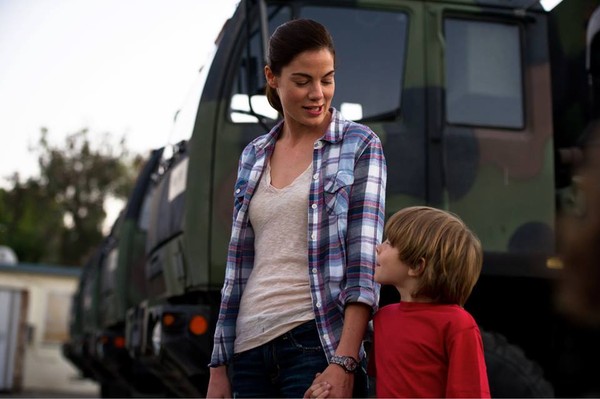
It's nonsensical that actress Michelle Monaghan isn't a bigger name in Hollywood. She is an excellent foil to Robert Downey Jr. in cult dark comedy Kiss Kiss Bang Bang, and inspires Jake Gyllenhaal in Source Code. She was even in the lauded first season of True Detective (which I didn't watch). Fort Bliss, a film written and directed by Claudia Myers, is a special treat for Monaghan fans. Instead of supporting an A-list actor onscreen, Monaghan gets her chance to lead a film.
She plays Staff Sgt. Maggie Swann, recently returned from service in Afghanistan. Maggie is an army medic, quick to respond to injuries in the field, yet thrown by the changes that have occurred while she's been abroad. Her young son Paul (Oakes Fegley, This Is Where I Leave You) has lived with Maggie's ex-husband Richard (Ron Livingston, Office Space) and grown extremely close to Richard's new wife Alma (Emmanuelle Chriqui, Entourage). Maggie expects a warmer welcome from her son than what she receives. Her father (John Savage, The Deer Hunter), also a veteran, reminds her about the story of Rip Van Winkle, and how long absences mean dealing with change upon return.

